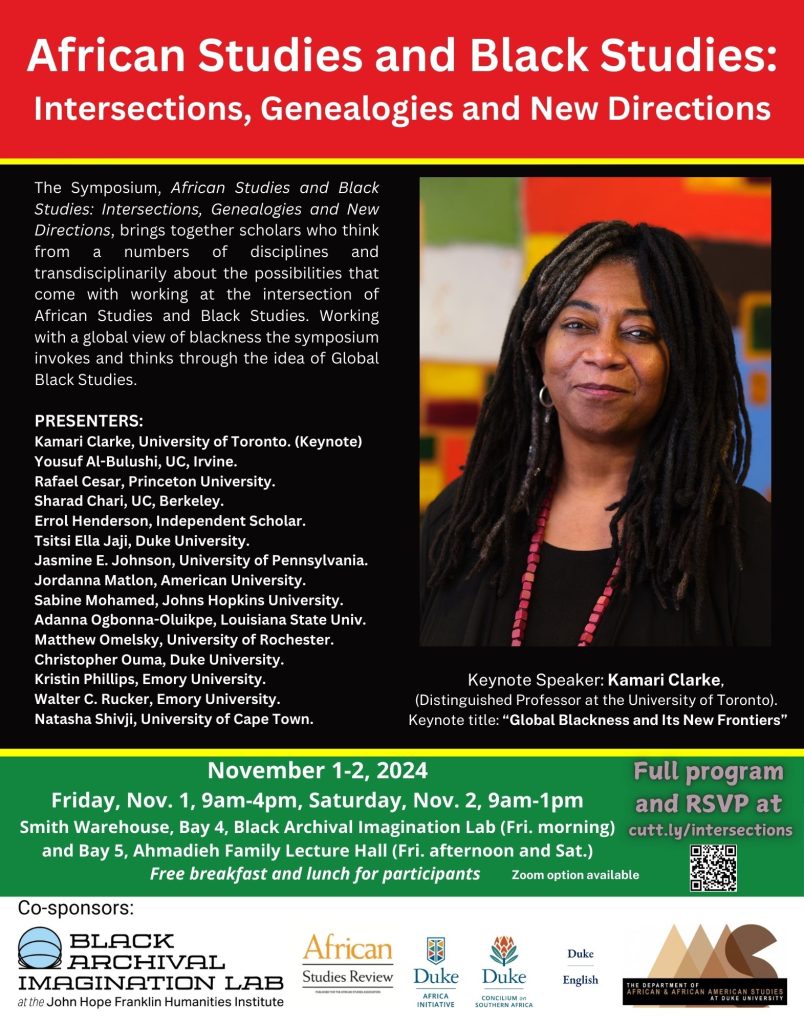African Studies and Black Studies: Intersections, Genealogies and New Directions brings together scholars who think from a numbers of disciplines and transdisciplinarily about the possibilities that come with working at the intersection of African Studies and Black Studies. While they are distinct fields with their own trajectories and genealogies Black Studies and African Studies have historically shared a number of important concerns; particularly around how racialization relates to state formation and sovereignty and how the historical and contemporary experiences of migration and diaspora have shaped the formation of identity, nationally and globally, among African and African descended people. More recently, scholars across these fields have engaged with the planetary crises associated with climate change and the Anthropocene as symptomatic of the ongoing lives of racial capitalism and its colonial remains. This global view of blackness both acknowledges and complicates national frameworks as privileged sites of knowledge-making while invoking the possibility of Global Black Studies.
Dates: Friday, Nov. 1, 9am-4pm, Saturday, Nov. 2, 9am-1pm
Locations: Smith Warehouse, Bay 4, Black Archival Imagination Lab (Fri. morning) and Bay 5, Ahmadieh Family Lecture Hall (Fri. afternoon and Sat.) – (Hybrid – Zoom option as well)
Free breakfast and lunch for participants
RSVP for in-person participation here
See below for the full program of the symposium.

Symposium Program
Friday, Nov. 1
9:00 – 9:30 Breakfast
9:30 – 10:00 Welcome
10:00 – 11:30 Panel 1
Jordanna Matlon (American University), “Reading hegemony from the African colonial project: Blackness, masculinity, and the évolué”
Sabine Mohamed (Johns Hopkins), “Empire from the South: Between the idea of Ethiopia and the politics of “medemer””
Rafael Cesar (Princeton University), “White Racelessness, Black Voicelessness: On the Need of Black Studies to Study Portuguese-Speaking Africa”
11:30 – 13:00 Panel 2
Sharad Chari (UC Berkeley), “Scenes of Blackness from South African Indian Ocean Shores”
Walter C. Rucker (Emory University), “Theorizing Social Life as Mnemonic Praxis: The Implications of the Early Modern Practice of Diaspora in Atlantic Africa”
Natasha Shivji (University of Cape Town), “Writing a continental history from the ocean: the Indian Ocean and Pan Africanism”
13:00 – 14:00 Lunch
14:00 – 16:00 Panel 3
Tsitsi Jaji and Christopher Ouma (Duke University), “The African Literature Association: A Storied Account of Black Studies”
Errol Henderson (Independent Scholar), “New Directions Wrapped in Old: The Howard School and the Nexus between African and Black Studies”
Kristin Phillips (Emory University), “The Racial Vernacular of Energy Disparities: Othering & Electricity in East Africa & the US South”
Yousuf Al-Bulushi (UC Irvine), “Walter Rodney in Tanzania: The Diaspora and the Continent”
Saturday, Nov. 2
9:00 – 9:30 Breakfast
9:30 – 11:00 Panel 4
Jasmine E. Johnson (University of Pennsylvania), “Africa and Returns: On West African Dance Tourism”
Adanna Ogbona-Oluikpe (Louisiana State University), “Entangled Categories: Blackness, Africanness and Racialized Spaces”
Matthew Omelsky (University of Rochester), “Global Black Speculative Collage”
11:00 – 11:15 Tea break
11:15 – 12:30 Keynote
Kamari Clarke (University of Toronto), “Global Blackness and Its New Frontiers”
12:30pm Lunch
